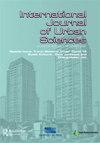Surviving the pandemic: COVID-19 and restaurant closures in Suzhou
IF 3
3区 工程技术
Q2 ENVIRONMENTAL STUDIES
引用次数: 0
Abstract
ABSTRACTThe outbreak of COVID-19 disrupts the economy and presents challenges to small and medium enterprises in various sectors. Focused on the restaurant industry in Suzhou, China, this study draws upon secondary data from Meituan Dianping and Baidu Map API and considers how variables related to restaurants themselves and variables pertaining to restaurants’ built environment conditions contribute to their survival during the pandemic with the use of regression analysis. For restaurants, it is important to have certain core competencies, such as price or quality advantage, if they were to survive external shocks. In addition, high population density of a restaurant’s surrounding area, one of the most crucial factors in determining business success under normal circumstances, significantly reduces its survival likelihood during the pandemic. We conclude by outlining opportunities for future research. HighlightsThis study examines what determines restaurant survival in the pandemic.The survival is influenced by both restaurant and built environment factors.Restaurants need to have specific core competencies to survive market shocks.Density and accessibility have adverse impacts on restaurant survival.The analysis provides policy suggestions for similar circumstances in the future.KEYWORDS: COVID-19core competenciesbuilt environmentrestaurantssurvival Disclosure statementNo potential conflict of interest was reported by the author(s).Additional informationFundingThis work was supported by Xi'an Jiaotong-Liverpool University: [Grant Number Key Program Special Fund (KSF-E-43)].在大流行中生存:苏州的COVID-19和餐馆关闭
【摘要】新冠肺炎疫情的爆发扰乱了经济,给各个领域的中小企业带来了挑战。本研究以中国苏州的餐饮业为研究对象,利用美团点评和百度地图API的二次数据,利用回归分析方法,考虑与餐馆本身相关的变量和与餐馆建筑环境条件相关的变量如何影响餐馆在疫情期间的生存。对于餐馆来说,如果要在外部冲击中生存下来,拥有一定的核心竞争力(如价格或质量优势)是很重要的。此外,餐馆周边地区的人口密度高,这是正常情况下决定企业成功与否的最关键因素之一,这大大降低了餐馆在疫情期间生存的可能性。最后,我们概述了未来研究的机会。这项研究探讨了在疫情中决定餐馆生存的因素。餐厅的生存受到餐厅和建筑环境因素的双重影响。餐厅需要有特定的核心竞争力,才能在市场冲击中生存下来。密度和可达性对餐馆生存有不利影响。分析结果为今后类似情况的发生提供了政策建议。关键词:covid -19核心竞争力建筑环境餐馆生存披露声明作者未报告潜在利益冲突。本研究由西交利物浦大学资助:[批准号:重点项目专项基金(KSF-E-43)]。
本文章由计算机程序翻译,如有差异,请以英文原文为准。
求助全文
约1分钟内获得全文
求助全文

 求助内容:
求助内容: 应助结果提醒方式:
应助结果提醒方式:


